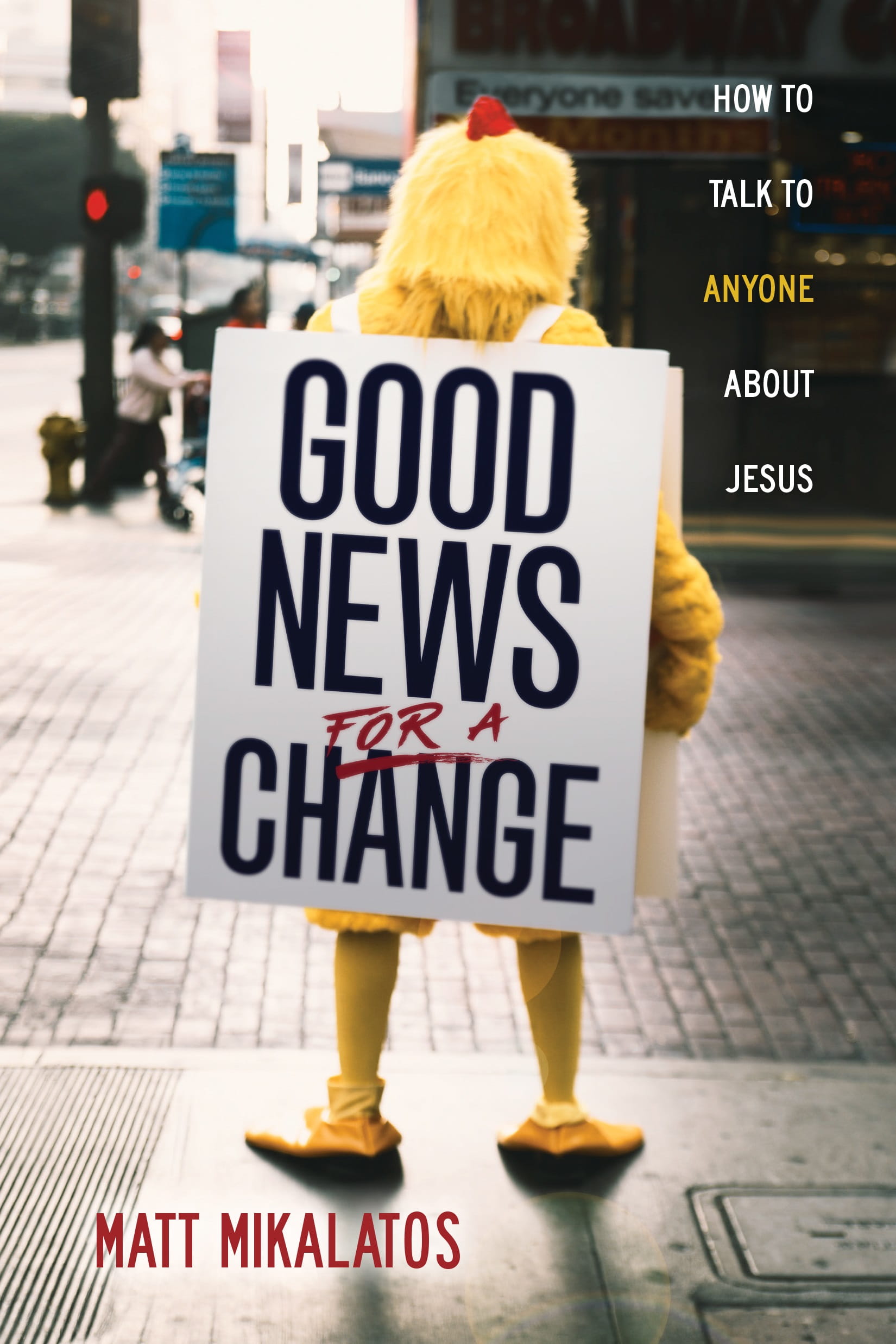How Do I Talk to LGBTQ Friends about the Gospel?

Many of us have a neighbor, coworker, friend, or loved one who is part of the LGBTQ community. Naturally, we want to talk with them about Jesus, but it can feel complicated and frightening—for us and for them! Here are a few suggestions to minimize the awkwardness.
Motivation and Consent Matter
I shared my first draft of this article with 25 LGBTQ friends and acquaintances, and two themes came up repeatedly: What is your motivation in trying to talk to someone in the LGBTQ community about Jesus? And has that person given you permission to enter into this deeply personal conversation?
If you are entering this conversation in the hopes of telling someone your opinion on their morals or life, or if you only want to change their minds or to “make them stop being gay,” then this is not a conversation you should be having. If mutual sharing (learning from each other), deep love for the person you’re talking with, and a desire to talk about the good news of Jesus is not your motivation, then you’re not ready for this conversation, even if your friend is.
Likewise, it’s important to have consent when talking about spiritual things. Ask for permission. It could be as simple as, “I’d like to talk about some spiritual things that are important to me, and I’d like to learn from your spiritual insights too. Would that be okay?” Waiting for consent shows respect. If someone says no, let them know you’d be interested in pursuing the conversation another time. Stay in loving relationship, and let them tell you when/if an appropriate time comes. This shows respect and builds trust.
Photo courtesy: ©Unsplash

Get to Know Their Spiritual History
There are a good number of LGBTQ people who are already followers of Jesus. There may even be a gay person in your church who is following Jesus, just like you are. Don’t assume that because someone is Queer they are not already connected spiritually . . . maybe deeply connected! Also, many in the LGBTQ community have experienced trauma in religious circles and have gone on to create a thriving spiritual community outside of traditional religious institutions. And some have experienced trauma or abuse in spiritual circles and have walked away. Knowing one another’s history can radically alter where your conversation goes. According to Pew Research, more than half of the LGBTQ community are religious, and most are Protestant or Catholic.
Photo courtesy: ©Unsplash

LGBTQ People (emphasis on people)
Sexuality and gender is important to most people, but they are more than their sexuality or gender. It’s easy for straight people to think of sexuality and gender in the LGBTQ community as definitional rather than descriptive. When we label others, it’s easier to distance ourselves from their humanity and to emphasize our differences.
But straight people and LGBTQ people have more commonalities than differences: Everyone has parents; hobbies; preferences; likes and dislikes; hopes and dreams; trauma and joy; and maybe a job, or pets. Then there’s religious history, nationality, ethnicity, and so on. The LGBTQ community is broad and, overall, tolerant of those who are different: There can be a lot of variety in the space between the L and the Q.
I, as a straight, white, cisgender male, have a lot in common with a bisexual Latina. We are both people, and while our sexual history and preferences may be radically different, we both have family. We both grew up somewhere. We both probably love Marvel movies or Star Wars or Shakespeare or ice-skating or bird watching. We were both made by the same God, who loves us both and wants us to be in loving relationship with Christ and with one another.
Photo courtesy: ©Pexels

Show Respect by Using the Terms and Definitions Your Friend Uses
This is especially important in the transgender community. If you grew up with your friend Nancy but now he would like to be called Ned, you should call him Ned. It’s okay if you feel awkward and weird or even struggle to remember at first. Just be honest: “I’m working on it; please be patient as I get used to this change.”
One of my friends told me that his family and friends often want to talk to him about Jesus, but they refuse to call him by his preferred name. He said, “You can’t talk to me about Jesus if you can’t say my name.”
Likewise, if a gay friend says, “I feel weird when straight people use the word queer because it has so often been used as a slur,” then by all means, don’t use that word (even if he does).
Photo courtesy: ©Unsplash

Don’t Lead with Whether or Not Homosexuality Is a Sin
Even if you have a lifelong, deep relationship with someone, it’s awkward if you start with this topic. And it’s not necessary in a conversation about whether or not to follow Jesus. We all have a laundry list of sins in our lives, and repentance requires acknowledging only one of them. (Did you recognize all your sins when you came to Christ, or have you discovered some since then?) Instead of getting into a fight about a place where you disagree, how about finding a place of agreement?
I like to ask, “Have you ever broken your own moral code?” My friend might say, “Yes. I have a lying problem.” Boom. We can talk all about sin and forgiveness and justification from there without getting distracted in an emotionally fraught conversation about sex and gender and our opinions about each.
Photo courtesy: ©Thinkstock/mheim3011

Practice Saying This: "You Can Be Gay and Follow Jesus"
When I tell a gay friend he can follow Jesus, he may respond by saying, “But I’m gay.” My temptation is to launch off on a long explanation of what I understand the Bible to say about human sexuality. However, I’m missing what my friend means. He’s not saying, “Tell me about sex.” He might be trying to shut down the conversation. He might be saying he doesn’t believe my Christianity has space for someone like him. He might even be saying he wants to come to Jesus but doesn’t believe it’s allowed for him. But I promise you, what he is not saying is “Tell me all your thoughts about sex.”
My LGBTQ friends tell me that the message they have heard from church or religious friends is this: “You can’t follow Jesus.” Whether because they were transgender or because they were in gay relationships, they were told they were not able to come to Jesus. It’s good to remember Philip’s words to the Ethiopian eunuch, who asked, “What hinders me from being baptized?” Philip said, “If you believe with all your heart, you may”. (Acts 8:36-37).
If my friend is asking, “What prevents me from following Jesus?” then my answer should be the same as Philip’s.
Photo courtesy: ©Unsplash

What Is Good News for This Person?
If I am with a transgender woman at the funeral of a mutual friend, it’s unlikely the good news of Jesus is going to intersect with her gender at that moment. She and I will both be focused on questions of life and death, loss, grief, mourning, and healing. The story of Lazarus or the teachings of Christ about the coming Kingdom are going to be much closer to the heart of what we are both experiencing. What, specifically, is good news about Jesus for this person? is a question I’m always asking myself regarding anyone I’m interacting with, regardless of who they are.
There Is Debate on This Topic among Well-Meaning Followers of Jesus
Whatever position you and I take on this question, whether the traditional reading or the open and affirming reading, remember that the people on the other side of this question are legitimate followers of Jesus, doing their best to follow God. This means that when I’m in conversation with an LGBTQ friend and she asks, “Do all Christians believe being gay is wrong?” I can honestly say, “There’s disagreement on this topic. And it’s going to be a really personal issue for you. It’s important that you find that answer for yourself and not rely on someone like me to tell you. And know there’s plenty of space and time for you to explore that question.” It’s also important to make sure, in this intensely personal question, that my friends are given the pieces to make this decision themselves. It’s okay to share your thoughts, but wait to be invited to do so.
Photo courtesy: ©Thinkstock

Remember That You’re Not the Expert about LGBTQ Issues or about This Person’s Life
If you’re straight, please don’t come into a conversation with your gay friend thinking you know all the answers because you read a book. And if you’re part of the LGBTQ community, or identify that way or would say that you “deal with same-sex attraction,” don’t assume the answer you’ve come to about how to live your life is the answer that all people should come to. Life in the LGBTQ community can be complicated, and this person’s decisions on how and whether to follow Jesus—and where and if and when that impacts their sexuality or gender—are going to be intensely personal and intersect with many other things. Share your experience, yes. Share your opinions, if they are welcomed and invited. But please enter in as a learner and a supportive, loving friend.
Photo courtesy: ©Pexels

A History of Trauma in the Church
Many LGBTQ people have experienced harm—spiritual , emotional, mental, and sometimes physical—at the hands of Christians. My friend in college had a brick thrown through his window with Bible verses written on it, for instance.
It’s important to keep this in mind, because as you can imagine, my friend might be extrasensitive to my pulling out a Bible and metaphorically hitting him over the head with it. There are many who have experienced bullying, assault, expulsion from their homes, ostracizing, or something similar as a result of being honest in their religious communities.
With victims of trauma, it is important to be overly kind (more kind than you would imagine was necessary), to be patient, to have repeated conversations as they process, and to make it clear that you are not only sorry for their experiences but are also committed to being a safe and loving person in their lives.
Remember That Suicide Rates among LGBTQ Youth Are Disproportionately High
Spiritual communities should be a place of refuge for LGBTQ youth. They need a place where they are not isolated; where they are safe from bullying, prejudice, and harm; and where they are unconditionally loved. If, for whatever reason, your spiritual community is not a good place for this, that would be a good thing to reflect on . . . and it would be helpful if you could help young people find places that will be supportive and loving.
Photo courtesy: ©Unsplash

Keep Your Focus on the Good News about Jesus
Wherever the conversation goes, whatever your point of view, don’t be distracted by disagreements, politics, theological constructs, and questions of morality. You want to talk about the GOOD NEWS of JESUS. If you find your conversation has wandered off into something other than good news, apologize and correct your course. If you discover Jesus has somehow faded from the center of your conversation and you’re talking about church politics or something else, gently steer it back on course.
One of my new LGBTQ friends who read this article pointed out that his community is one that has experienced wounding and rejection. In a wounded, rejected community, the theological words of the gospel will sound empty and lifeless unless those words are accompanied by the gospel of loving action. If you are not providing community, kindness, and acceptance, your words will sound hollow. The good news of God’s love will sound like a lie if you don’t show that love in your own relationships.
Photo courtesy: ©Unsplash

Remember...
God loved the world enough to send Jesus so that anyone who believes can be saved. Emphasize those points: God’s love. Jesus came to us. Anyone can believe. Anyone can be saved. That’s good news!
Scripture taken from the New King James Version,® copyright © 1982 by Thomas Nelson, Inc. Used by permission. All rights reserved.
Matt Mikalatos writes books (surprise!). In the past, Matt worked as a high school teacher and a clerk at a comic book store. Currently he focuses on nonprofit work devoted to helping people love one another despite their differences. He lives in Portland, Oregon, with his wife and three daughters, two unicorns, a gryphon, a dragon, and three brine shrimp.
Good News for a Change, by Matt Mikalatos
ISBN 978-1-63146-856-8
Softcover, $15.99
June 2018
NavPress.com
Photo courtesy: ©Unsplash
Originally published June 08, 2018.









